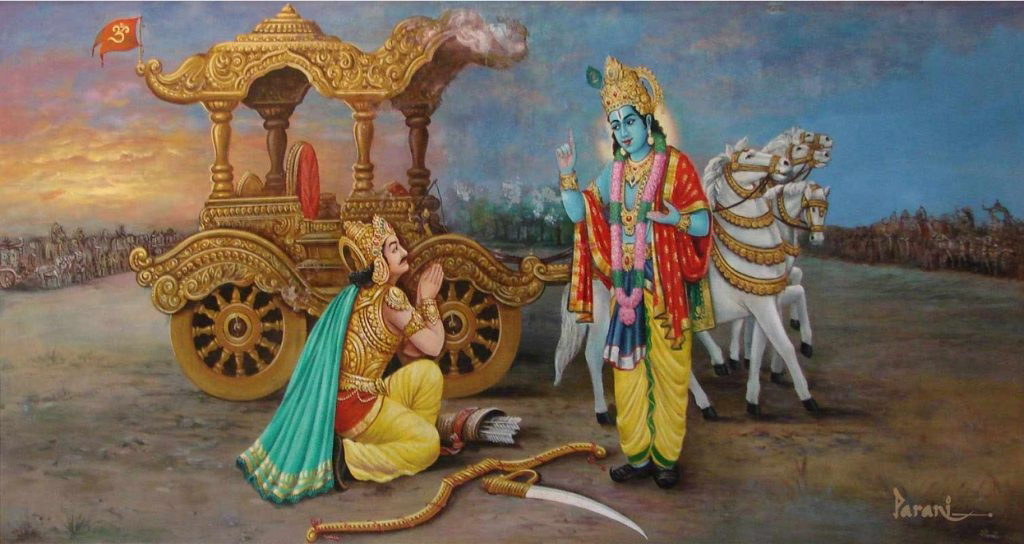The Bhagavad Gita | Chapter 1 : Arjuna's Despair |
अथ प्रथमोஉध्यायः ।
धृतराष्ट्र उवाच ।
धर्मक्षेत्रे कुरुक्षेत्रे समवेता युयुत्सवः ।
मामकाः पाण्डवाश्चैव किमकुर्वत सञ्जय ॥ 1 ॥
सञ्जय उवाच ।
दृष्ट्वा तु पाण्डवानीकं व्यूढं दुर्योधनस्तदा ।
आचार्यमुपसङ्गम्य राजा वचनमब्रवीत् ॥ 2 ॥
पश्यैतां पाण्डुपुत्राणामाचार्य महतीं चमूम् ।
व्यूढां द्रुपदपुत्रेण तव शिष्येण धीमता ॥ 3 ॥
............
.........
यदि मामप्रतीकारमशस्त्रं शस्त्रपाणयः ।
धार्तराष्ट्रा रणे हन्युस्तन्मे क्षेमतरं भवेत् ॥ 46 ॥
सञ्जय उवाच ।
एवमुक्त्वार्जुनः सङ्ख्ये रथोपस्थ उपाविशत् ।
विसृज्य सशरं चापं शोकसंविग्नमानसः ॥ 47 ॥
ॐ तत्सदिति श्रीमद्भगवद्गीतासूपनिषत्सु ब्रह्मविद्यायां योगशास्त्रे श्रीकृष्णार्जुनसंवादे
अर्जुनविषादयोगो नाम प्रथमोஉध्यायः ॥1 ॥
Summary
Blind King Dhritarashtra asks the poet Sanjaya to tell him the story of his family, the Kurus, clashing with the Pandavas in battle. Sanjaya retells how King Dhritarashtra's son, Prince Duryodhana, asks his teacher, Drona, to look out at the assembled forces. Duryodhana points to the strong and formidable members of the Pandava army that includes both Krishna and Arjuna. He then turns to the powerful people in his own army, mentioning great warriors among them. Duryodhana proudly proclaims the Kuru army is limitless, whereas the Pandavas are much smaller. Both armies blow conch shells that echo "throughout heaven and earth," calling the warriors to battle.
Arjuna tells Krishna to drive the chariot carrying them so they can stand between the two armies. He wants "to look at the men gathered ... to do battle service for Dhritarashtra's evil-minded son." Krishna directs Arjuna's attention to all the Kurus ready to battle one another. Arjuna is overwhelmed with dread as he looks out at the opposing armies made up of his kinsmen. Not wanting to fight his family even if they are foes, he tells Krishna that he sees "evil omens ... from killing my kinsmen in battle." Arjuna tells Krishna it would be better to let himself be killed in the battle without resistance than to fight this terrible battle.
Analysis
The opening chapter of the Gita introduces the two opposing armies and their principal members. Looking out at his army, Prince Duryodhana feels invincible despite the strength of the Pandava fighters. Duryodhana's description of the scene introduces the reader to the principal figures in each army. Prince Duryodhana's family members are referred to as the Kurus because they are descendants of King Kuru. However, through much of the Mahabharata these descendants are called the Kauravas. The Pandavas are also descendants of the Kuru clan, but as the "sons of Pandu" they are known as the Pandavas. As Arjuna points out to Krishna, the Pandavas and the Kauravas are actually cousins because all are descended from the same king: Kuru.
Arjuna's conversation with Krishna opens the dialogue that forms the Bhagavad Gita section of the Mahabharata epic. Arjuna's reluctance and despair at the thought of killing his kinsmen forms the basis of the subsequent conversation with his charioteer, the god Krishna. It is important to note Arjuna's reference to the caste system and his belief in its purpose. Arjuna fears that by killing his kinsmen he will be doing evil that will seep into the family structure and cause the mixing of castes. Arjuna understands the intermingling of castes to be a disaster that could bring down their great family. However, what he proposes—to go into battle unarmed and let himself be killed—is a form of inaction. By refusing to act he hopes to avoid creating bad karma, or fate, for himself and thus not be responsible in this life or in the next for the perpetuation of evil.
Chapter 1 Quotes
" Intermixture of castes drags down to hell both those who destroy the family and the family itself"
Arjuna, Chapter 1
In his moment of uncertainty and desperation, Arjuna rationalizes his desire to avoid killing his cousins. These words come at the end of a series of rationalizations wherein Arjuna worries his actions in battle—killing his cousins—will destroy the family system, which could lead to the mixing of different castes. In Arjuna's worldview, allowing such mixing is a grave issue that could damn anyone involved.
Application part in human affairs
In our daily lives, we often face situations where we must confront our responsibilities and make choices that impact not only ourselves but also those around us. Similar to Arjuna's inner struggle in the Mahabharata, we may find ourselves torn between personal convictions and societal expectations.
For instance, when confronted with challenges at work or within our families, we might grapple with decisions that seem morally complex. Arjuna's reluctance to harm his own kin resonates with the ethical dilemmas we encounter, questioning the greater good versus personal ties.
Moreover, Arjuna's consideration of the caste system reflects how societal norms can influence our decisions. In contemporary contexts, we may encounter dilemmas tied to societal expectations, pushing us to reevaluate our actions and their potential consequences on a broader scale.
Arjuna's initial inclination towards inaction, driven by a desire to avoid negative consequences, mirrors our own tendencies to evade difficult choices. In our daily lives, we might opt for the easier path, even if it means not actively addressing challenges or conflicts.
The Bhagavad Gita's exploration of duty, morality, and the consequences of inaction serves as a timeless guide. Applying these insights, we can strive to make informed, ethical decisions, navigating the complexities of our modern lives with a sense of responsibility and awareness of the potential impact on those around us.
यतो धर्मस्ततो जयः..🙏



Nicely written 👌👍
ReplyDelete